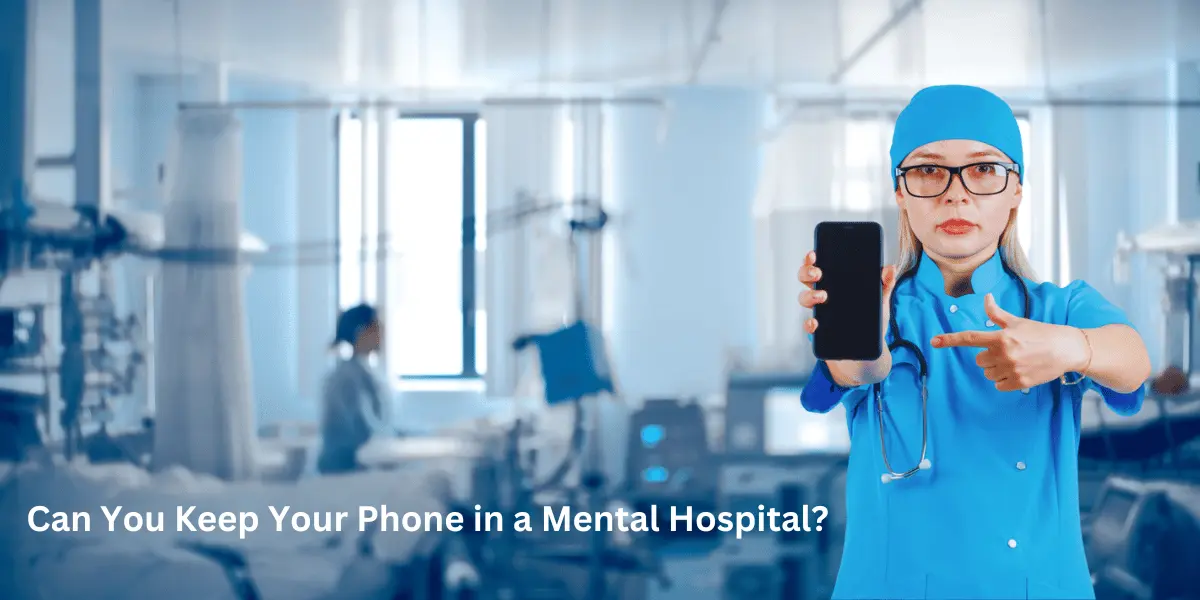In most mental hospitals, phones are restricted due to safety, privacy, and therapeutic concerns. Limited or supervised access may be allowed depending on the facility’s rules.
This policy can be particularly relevant for individuals like Sarah Patel, a busy professional who values connectivity and relies heavily on digital tools for work and personal life. While it may feel restrictive, limiting phone usage prioritizes patient safety and recovery, balancing device access risks and benefits.
Can You Keep Your Phone in a Mental Hospital?
In most mental hospitals, phones are restricted due to safety, privacy, and therapeutic concerns. Limited or supervised access may be allowed depending on the facility’s rules.
Why Are Phones Restricted?
In psychiatric inpatient settings, smartphones and computers are often restricted for critical reasons related to privacy and safety. For someone like Sarah, who may feel uneasy about being disconnected, these restrictions are not about imposing rigid rules but preventing potential harm. For instance:
- Risk of Injury: A broken phone screen could be used for self-harm, a risk heightened in vulnerable patients.
- Privacy Violations: Sharing sensitive information, such as photos or details about fellow patients, could lead to legal complications and emotional distress.
- Misuse of Online Platforms: Excessive scrolling on platforms like Instagram can worsen mental health, fueling comparison or anxiety.
- Overuse of the Internet: Being online too much might distract from therapeutic goals, making recovery more challenging.
The aim is to create a controlled, safe environment where patients can focus on healing without external pressures.
Balancing Access and Recovery
Modern mental health facilities understand the importance of connecting to the outside world, particularly for tech-savvy individuals like Sarah, who might rely on their devices for emotional support or work obligations. Many hospitals offer controlled access to phones, such as:
- Supervised Calls: Set times and monitored environments to ensure communication while maintaining safety.
- Message Access: Patients may use their phones under staff supervision for limited messaging.
- Alternatives: Facilities often provide landlines or shared devices for essential communication with family or work contacts.
This approach strives to balance the need for connection with the goal of safety and recovery.
Mental Health Facilities
Mental health facilities cater to diverse needs and provide specialized care based on an individual’s situation. These include:
- Privately Run Centers: Often offering premium services that appeal to professionals like Sarah, who might prefer a high-quality, discreet environment.
- Regional and Community Programs: Affordable options for those seeking accessible care locally.
- Federal Facilities: Comprehensive treatment centers providing cost-effective care, particularly for severe or specialized cases.
Some facilities also treat substance use disorders, recognizing these as mental health conditions. Whether it’s outpatient programs, inpatient care, or residential options, facilities aim to offer tailored solutions for recovery.
Facilities that provide personalized programs and clear communication about device policies may be most appealing for a patient like Sarah, who values structured but flexible approaches.
Why These Decisions Matter
The restrictions on smartphones and computers in mental health facilities reflect a thoughtful approach to recovery, prioritizing safety and minimizing external distractions. Understanding these policies may help reduce anxiety about seeking inpatient care for professionals like Sarah or others in your target audience.
If you’re wondering, Can I Go to Urgent Care for Mental Health Treatment? It’s essential to know that urgent care centres address immediate concerns but may not provide the comprehensive care offered in mental health facilities.
These decisions about device use are not arbitrary but are designed to protect individuals and create a supportive environment where recovery can flourish.
Concerns About Access to False Health Information
A key concern with allowing unrestricted Internet access in a psychiatric hospital is the overwhelming volume of online information, which can confuse individuals from diverse backgrounds.
This issue can be particularly challenging for someone like Sarah Patel, who values accuracy and clarity. Many users searching for health-related topics fail to verify the validity of the advice they encounter.
Often, they trust sources that align with their existing beliefs, inadvertently spreading false information alongside accurate details.
In a mental health setting, this risk can undermine treatment goals. Misinformation can lead to conflict with established treatment plans, misunderstandings with healthcare providers, or poor care decisions.
For instance, a patient might discover unverified claims online and challenge a psychiatrist’s prescribed therapy or medication.
This issue is especially concerning in moments of heightened vulnerability.
For example, during experiences of discomfort or isolation—like struggling with feelings of anxiety or engaging in calming yet introspective activities such as Showering in the Dark—patients may turn to the Internet for answers, making them more susceptible to harmful or misleading content.
For individuals like Sarah, who rely on digital tools daily, this highlights the importance of having access to vetted, reliable resources in such facilities.
Potential Mental Health Impact of Computer and Phone Use
Excessive Internet use can sometimes exacerbate mental health concerns. This factor becomes even more critical in environments like psychiatric hospitals.
Research suggests that heavy screen time may contribute to or worsen conditions such as anxiety disorders, depression, and social difficulties.
For someone like Sarah, who appreciates balance and thoughtful technology use, this underscores the importance of moderation in digital habits.
While the exact causes behind these mental health effects aren’t always clear, the risks are significant enough to merit attention.
In my experience helping people cultivate healthier digital habits, many don’t realize how constant connectivity subtly influences their moods and relationships. It’s not merely the apps or devices themselves—it’s how they shape our thought patterns and behaviours.
For individuals already grappling with mental illness, such as those managing symptoms like OCD Mood Swings, excessive screen time could hinder recovery. Increased isolation, heightened stress, or disrupted routines caused by overuse may make it harder for patients to focus on healing.
While not everyone is affected the same way, the potential for harm should encourage facilities to thoughtfully design policies around technology use, especially when caring for vulnerable individuals.
How to Communicate from a Mental Health Facility
In many private mental health facilities across the U.S., especially those managed by insurance providers, strict policies govern phone use. Based on my experience working across different states, these policies are designed to balance connectivity with therapeutic goals:
Phone Management
Patients’ phones are often signed into the nursing station, placed on a designated shelf organized by room number, and retrieved only for specific purposes.
Calls might be limited to setting up appointments or communicating with family members, and these privileges are typically earned over time. Usage is confined to specific areas and timeframes, ensuring structure and supervision.
Alternative Communication Options
Instead of personal devices, desk phones are commonly provided to serve communication needs. Staff supervises these to ensure appropriate usage.
Similarly, computers in vocational therapy are used under the guidance of therapists, helping patients focus on productive activities such as job searches, resume writing or skill-building.
Purposeful Activities
Hospitalization provides a break from life’s external stressors, allowing patients to focus on self-reflection, healing, and forming connections within a therapeutic community.
Instead of relying on technology, patients engage in structured activities like board games, card games, or watching movies with peers. These activities foster teamwork, problem-solving, and a sense of safety, creating an environment conducive to growth and emotional healing.
Therapeutic Integration
These experiences are closely tied to therapy sessions, including group discussions, one-on-one sessions with staff, or individual counselling.
Patients are encouraged to reflect on their interactions, fostering insight into their behaviour and thought patterns. Spending time on a cell phone or engaging in repetitive conversations with family or friends often detracts from this healing process.
This is why many patients, including high-functioning professionals like Sarah, benefit from the structured disconnect that hospitalization provides.
The goal is not to deny patients their independence but to create an environment where they can focus on recovery and personal growth without the distractions or potential harm associated with excessive phone or computer use.
FAQ’s
Q: Does your Phone Get Taken Away in a Mental Hospital?
In a psychiatric hospital, you may have limited access to your phone if you enter voluntarily, but in involuntary cases, expect no access to your own device at all.
Q: Why Are Phones Not Allowed in a Mental Hospital?
In the USA, bringing a cellphone to a psychiatric unit can violate HIPAA guidelines as it may compromise patient privacy by allowing phones to record conversations or take photos. Even on open wards, this is not permitted due to the same issue.
Q: Is Listening to Music Allowed in a Mental Hospital?
Music is often played on a radio that’s available to patients, but if you like something that isn’t normally aired, you’re out of luck. While therapy dogs may sometimes visit, you’ll never see cats in such settings.
Conclusion
Navigating life in a mental hospital involves balancing personal preferences with safety, privacy, and therapeutic goals.
While access to phones, music, or personal devices might be limited, these restrictions are designed to foster recovery and create a supportive environment for everyone.
By minimizing external distractions and risks like false information or excessive connectivity, patients can focus on healing through meaningful activities, therapy, and interactions with peers.
Mental health facilities strive to prioritize well-being and recovery, emphasizing the importance of structured care and mindful technology use during such critical times.











